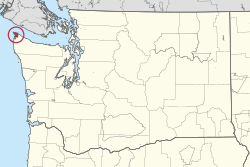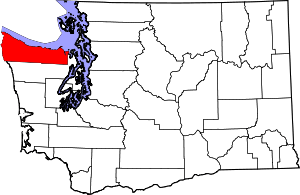Makah Reservation
Makah Reservation is an Indian reservation of the Makah Native Americans located on the northwestern tip of the Olympic Peninsula in Clallam County, Washington, United States. The northern boundary of the reservation is the Strait of Juan de Fuca. The western boundary is the Pacific Ocean. It has a land area of 121.451 square kilometres (46.892 sq mi) and a 2000 census resident population of 1,356 persons. Its largest community is Neah Bay.
Makah Reservation | |
|---|---|
 Location in Washington | |
| Tribe | Makah Tribe |
| Country | United States |
| State | Washington |
| County | Clallam |
| Headquarters | Neah Bay |
| Government | |
| • Body | Tribal Council |
| • Chairman | John Ides, Sr. |
| • Vice-Chairman | Keith Johnson |
| • Treasurer | Leah Neuneker |
| Population (2017)[2] | |
| • Total | 1,559 |
| Website | makah.com |
The Makah Tribe was also a whale hunting tribe. They especally hunted gray whale for its size and weight. Some times while hunting, they traveled 30,40, or 100 miles out to sea.
The Makah in the early nineteenth century inhabited Cape Flattery, Washington. According to the Lewis and Clark expedition, they then numbered some 2,000. The Makah are the southernmost of the Wakashan linguistic group, and the only member of this family living within the current boundaries of the United States. Other bands are First Nations peoples on the west coast of Vancouver Island, British Columbia.
Makah culture was fundamentally that of the Pacific Northwest Coast area. In 1855 they ceded all their lands to the United States except a small area on Cape Flattery that was set aside as a reservation. Today most of the 1,600 Makah in the United States live on the Makah Reservation; their main tribal income is from forestry.
Non-tribal members visiting the reservation are required to purchase a pass upon entering the reservation. Guests on official business are given a free pass.
See also
- Indigenous languages of the Americas
- Nuu-chah-nulth
External links
- makah.com "Makah Tribe", official website
- The Makah Tribe: People of the Sea and the Forest, University of Washington Library
- Makah Tribal Profile
- "Makah Prepare to Hunt Whales", Turtle Track
- Andrew Engelson, "Makah Tribe's trail eases access to a wild stretch of coastline", Seattle Post-Intelligencer, 20 November 2003
- Forks Guide - S.R. 112 to Neah Bay
References
- "Makah Tribal Council". Retrieved 2019-07-24.
- 2013-2017 American Community Survey 5-Year Estimates. "My Tribal Area". United States Census Bureau.
